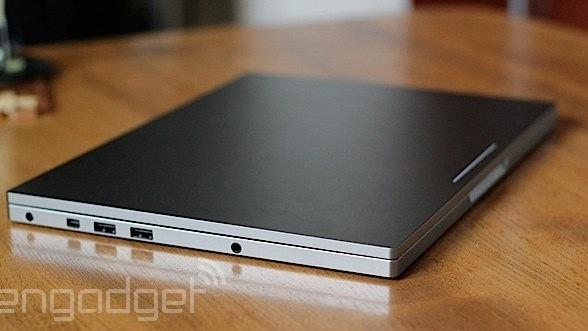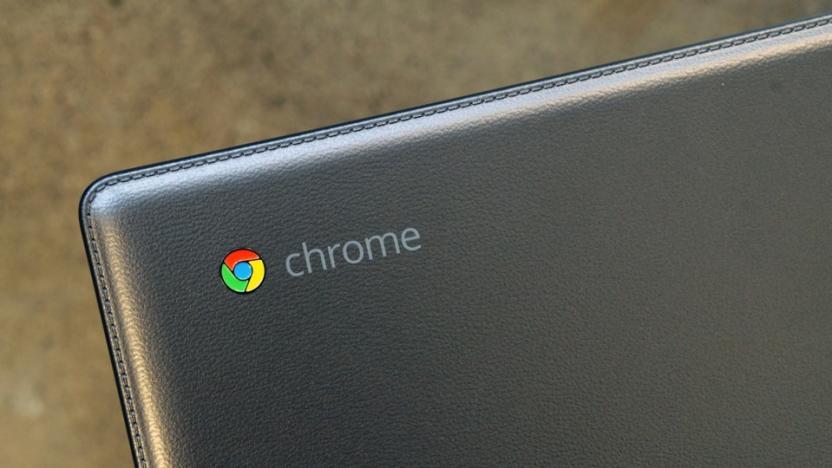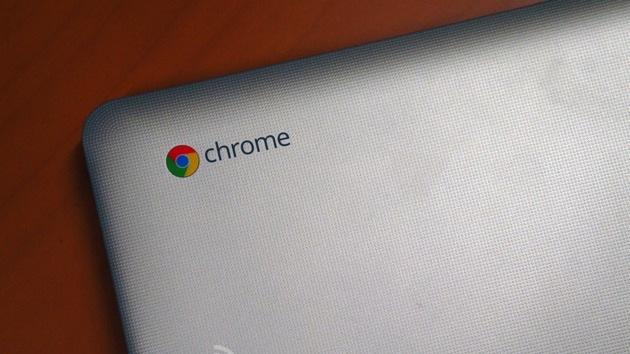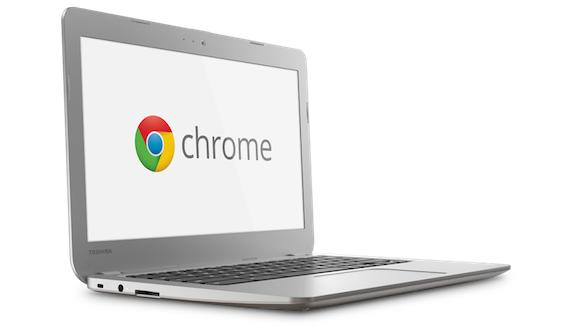chromebooks
Latest

Acer's Chromebook 13 lasts a stunning 13 hours on a charge
Until now, if you wanted a Chromebook with a full HD display, you only had one option: the 13-inch Samsung Chromebook 2. Want epic battery life? Yep, all roads lead to Samsung there, too. Well, not anymore, anyway. Acer just announced the Chromebook 13, and it matches Samsung nearly spec for spec with an optional 1080p display and NVIDIA's quad-core Tegra K1 chip, promising up to 13 hours of runtime (details on that after the break). This is interesting for two reasons. First off, although this is essentially the same class of product as what Samsung is selling, it costs $100 less: $299, versus $400 for the Chromebook 2. Sounds good, right? What's more, this is the first-ever Chrome OS device with an NVIDIA processor inside.

Acer C720 review (Core i3): a more powerful Chromebook
Whether rightly or wrongly, Chromebooks have earned a reputation for being the new netbooks. Slowly, though, things are starting to change. The designs are starting to feel less cheap -- at least if you're Samsung. Battery life is getting longer, sometimes even better than on full-fledged laptops. And now, performance is getting stronger, too: Acer just became the first company to release a Chromebook with a Core i3 processor, one that can better withstand multitasking, gaming and whatever rich websites you're likely to visit. The C720, as it's called, is actually the same 11-inch Chromebook Acer's already been selling, just with a beefier CPU inside, and theoretically longer battery life -- 8.5 hours, up from 7.5. As ever, though, Acer kept the price down: This guy starts at just $350, just a little more than what you'd pay for a much lower-powered system from some other brands. The question is: Does processing power trump everything else? And if it does, are you better off waiting for other Core i3 models to come out?

Verizon backpedals after cutting off free LTE for Chromebook Pixel owners
Nothing like a public shaming to make a company do an about-face. After cutting off free LTE service for Chromebook Pixel owners earlier than expected, Google stepped in to offer users a $150 gift card. Outrage from users persisted, though, and now Verizon appears to be reversing its decision. "We do understand that a very small number of Chromebook Pixel customers may have had a promo end prematurely," a Verizon spokesperson told TechCrunch. "We apologize for this, and will work with these customers to address the situation." Based on that statement (and what a vague statement it is), it's unclear whether the carrier actually intends to restore LTE service, or whether it intends to make amends some other way. We're asking Verizon to clarify, and will update this post if we hear more.

Google brings Chromebooks to more countries around the world
We're sure folks from New Zealand, the Philippines, Denmark, Norway, Mexico and Chile can find ways to buy a Chromebook if they want to. But now that Google's officially bringing the minimalist laptop to their countries, it'll be easier to get one from Google Play or from partner retailers if their Play Stores (frustratingly) don't sell hardware. Google's also extending its European tour to bring Chromebooks to even more countries in the coming weeks, particularly Belgium, Italy and Spain. Sadly, the company's poem announcement didn't mention which models are coming, so we can't say if any of the countries are getting Samsung's new Chromebook 2 or Google's own pricey Pixel. That's probably because Google has yet to iron things out with manufacturers... or the author ran out of steam to rhyme after 11 stanzas.

Samsung Chromebook 2 review: A $400 laptop never looked so good
Chromebooks seem to be having a moment. Which is odd, because for a while there, nobody seemed to be giving them a chance. Since the first Chromebook came out, about three years ago, Chrome OS devices have gotten flak for not being able to do as much as Windows machines. And to be fair, they couldn't, especially in the beginning. Manufacturers responded by slashing prices, but that led to a whole other problem: endless netbook comparisons. Indeed, many Chromebooks until now have been small, dirt-cheap and woefully low-end. To be avoided, mostly. Lately, though, the tides have been changing. Nearly every PC maker is making a Chromebook, if not several, and many will soon be upgrading their models with heavier-duty Intel Core i3 CPUs -- processors so powerful you might actually consider a Chromebook for your next laptop. Samsung, meanwhile, is taking a different approach: It's decked out its new 11- and 13-inch Chromebook 2 laptops with a stylish faux-leather lid, similar to what it did on the high-end Galaxy Note 3 and Galaxy Note Pro. Samsung also went with a full HD screen on the 13-inch model, making it the only notebook I know that's this cheap with this nice a display. With a starting price of $320 ($400 for the 13-incher), the Chromebook 2 is on the pricey side, but then again, you're paying for better quality. So is it worth it?

Chrome OS gets better organized with latest update
The Chromebook revolution is here and, naturally, Google is doing everything it can so that these devices keep improving even as time goes on. As such, the search giant today revealed some new things rolling out to Chrome OS laptops and desktops, including support for folders within the launcher and the ability to use hands-free voice commands (aka "OK, Google") in English. What's more, this new version of the OS, released through the Chrome stable channel, brings back the minimize button, with Google stating that it listened to your feedback and knew you really wanted the feature to be part of the window controls. Unfortunately, not all Chrome OS devices will get this -- namely, the ASUS Chromebox and Samsung Series 3 Chromebox. Google didn't say whether the update will ever come to the omitted Chromeboxes, but we'll let you know if anything changes.

Google aims for the mainstream with 20 new, more powerful Chromebooks
If you haven't picked up a Chromebook just yet, you might want to wait a little longer. Intel has just announced plans to roll out as many as 20 new Chromebooks by the latter half of this year. This new set will be thinner, lighter, more powerful and generally more diverse in terms of design. It's clear that Google is making a play for the mainstream.

Lenovo outs two more Chromebooks, one has a folding, Yoga-like screen
When Lenovo gets into something, it really gets into it. Exhibit A: the company's recent Chrome OS kick: it just announced two more Chromebooks, after having released two kid's versions last month. Today's new additions include the N20 and N20p, two 11.6-inch machines with basically the same specs. The difference? The N20 is a classic clamshell laptop with a non-touch display, whereas the N20p has a touchscreen that folds backward -- yep, kind of like on the Yoga line. We say "kind of" because in this case, the screen only folds back 300 degrees, as opposed to the 360. That's still fine for watching movies and such; just don't expect to use this as a proper tablet replacement.

Feedback Loop: Fire TV questions, remembering Windows XP, Chromebooks and more!
Welcome to Feedback Loop, a weekly roundup of the most interesting discussions happening within the Engadget community. There's so much technology to talk about and so little time to enjoy it, but you have a lot of great ideas and opinions that need to be shared! Join us every Saturday as we highlight some of the most interesting discussions that happened during the past week. This week, we took a closer look at the Fire TV and answered your questions about Amazon's latest gadget, reflected on the end of Windows XP, discussed options for coding and writing on a Chromebook and shared our impressions of RBI Baseball 14. Head on past the break to find out what other Engadget users like you had to say and then join the conversation in the Engadget forums!

Lenovo's new kid's laptop has a folding, Yoga-like screen (and there's a Chrome OS version too)
Here's how you unveil a product and make sure no one hears about it: Bury the news in a press release the same day you announce you're buying an iconic tech company for $3 billion. That's right: Everyone was so busy pontificating on whether Lenovo would ruin Motorola, that barely anyone noticed the company had also announced a kid's laptop. Well, we just had a chance to get hands-on with the new ThinkPad 11e ahead of its release, and while we might not normally care about kiddie PCs, a few things stick out here. First off, this is actually a collection of four different laptops, with two running Windows and two based on Chrome OS. Kind of a peculiar strategy when you think about it: How often do we get that kind of choice on the same machine? Secondly, Lenovo's offering two form factors: a traditional non-touch notebook, and another with a touchscreen that folds back into a quasi-tablet mode. Yep, it's basically a wee little Yoga, with a hinge that rotates 360 degrees. And, you know, it potentially runs Chrome OS. Now you see why we're so intrigued, right? You grown-ups probably want one too.

Samsung's latest Chromebooks come wrapped in faux-leather, on sale next month for $320 and up
It's been over a year since Samsung released a new Chromebook, and since then the competition has been heating up: Dell, HP, Lenovo and Toshiba all sell Chrome OS devices now, as does Acer, which has been at it from day one. Accordingly, Samsung is refreshing its lineup: the company just announced the Chromebook 2, which comes in 11- and 13-inch screen sizes, and will ship next month starting at $320 for the smaller version (the bigger one costs $400).

Google and VMware team up to put your Windows desktop on Chromebooks
So, your bosses have replaced most of the office computers with Chromebooks, but you need those old Windows apps to keep you sane. If the IT folks aren't on top of it already, you may want to tell them about a remote access solution developed by Google and VMware called Horizon Desktop as a Service (DaaS). According to VMware (known for its Fusion desktop clients), DaaS gives you secure access to all your Windows apps and data by storing sensitive info on remote servers instead of devices carried around by forgetful employees. The product's only available as a subscription-based offering right now, but folks at home who can't live without their trusty Windows applications may want to hold off protesting -- it's also slated to hit the Chrome App Store sometime soon.

Toshiba Chromebook arrives in the US and UK, slightly pricier than expected
Back at CES, Toshiba told us that its new Chromebook would be shipping on February 16th. It appears, though, the company has decided to make it available ahead of time, as the 13-inch Chrome OS laptop is now up for grabs in the US and UK. In a small twist, however, Toshiba is listing the Haswell-powered Chromebook for $300 on its website, a small bump over the $279 price it was announced with earlier this year. That said, retailers like Adorama and Amazon do have it for around $280, so you could still enjoy that lower price after all. Meanwhile, in the United Kingdom, Amazon's selling the Toshiba Chromebook for £249, with shipments expected to begin February 10th.

Toshiba Chromebook is the company's first Chrome OS device; arrives next month for $279 (hands-on)
We already knew Toshiba was coming out with a Chrome OS device, but in the four months since Intel teased it at IDF, we haven't seen anything in the way of specs, much less product shots. That changes today: The company just announced the Toshiba Chromebook here at CES, making this the first time we've seen the device up close. Of note, this has a 13-inch display, which, for whatever reason, has never been used on a Chromebook before. At any rate, Toshiba is betting that consumers coming over from Windows and Mac machines will want the same in-between-sized screen they're already used to -- especially if they plan on spending a lot of time in Gmail and GDocs. Due to that larger screen, this is naturally going to be a bit heavier than, say, the HP Chromebook 11 (three pounds vs. 2.3), but what you lose in portability, you'll make up for in power. While HP's offering makes do with an ARM processor, the Toshiba Chromebook offers a Haswell-series Celeron 2955U CPU for the same price, promising stronger performance and longer battery life (up to nine hours, say company reps).

Google+ Photos app now available for all Chromebooks, no longer limited to the Pixel
Aside from the super high-res display, the Pixel has also had something else other Chromebooks didn't: the Google+ Photos app. Starting today, however, Google's changing that and bringing the application to the rest of the Chromebook family, making it accessible outside of its sleek, pixel-packed laptop for the first time. The Google+ Photos app, which is available in 52 languages, remains unchanged otherwise, and users can download it now via the Chrome Web Store.

Acer to expand its Android and Chromebook lineup, offer fewer Windows devices
Historically, most of Acer's device lineup has been focused on Windows products -- it's the fourth-largest PC maker, after all -- but a less-than-pleasant second quarter seems to have given the company reason to switch its strategy up a bit. According to the Wall Street Journal, Acer is looking into expanding its Google-centric efforts; although it will continue a strong partnership with Microsoft, the Taiwanese manufacturer aims to offer more Chromebooks and Android products, while pushing fewer laptops or tablets sporting Win8. Chairman J.T. Wang told the Journal that smartphones, tablets and Chromebooks are expected to make up 10-12 percent of the company's revenue by the end of this year, while that number should bump up to 30 percent in 2014.

NPD: Chromebooks take 20 to 25 percent of sub-$300 laptop market in the US
Snapped up a Chromebook for less than three Benjamins? If so, NPD thinks you've made Page and Co.'s devices account for 20 and 25 percent of laptops sold for under $300. Stephen Baker, an NPD analyst, told Bloomberg that the research firm was initially skeptical about the cloud-tied laptops, but Google's hardware "found a niche in the marketplace." Mountain View's mobile PC foray took eight months to reach current sales numbers and NPD claims that based on price, they're the fastest-growing part of the PC industry. Bloomberg attributes the recent uptick in sales to the education market and early adopters -- increased retail availability probably doesn't hurt, either.

Google announces Chromebooks are coming to more retailers around the world
Sure, you can already snag one of those Chromebooks from places such as Amazon, Best Buy and Google's own Play shop. But, starting today, the Mountain View-based company is making various Chrome OS-sporting laptops available at more retailers around the globe -- over 6,600, to be specific. Google says the likes of Walmart and Staples will now have a selection of Chromebooks up for grabs, while Office Depot, Office Max and Fry's are expected to do the same "in the coming months." For those across the pond, you can expect to find some of Google's laptops at Dixon retailers in the UK, as well as Mediamarket, FNAC and Elgiganten stores in the Netherlands, France and Sweden, respectively. All in all, this is definitely a good thing for Google's plan to get its Chromebook machines in as many locations as possible.

Malaysia's Ministry of Education goes gaga for Google, adopts Chromebooks and Apps for Education
In the past, "going Google" was something only cities or state and federal governments did -- transitioning entire systems to the tech giant's cloud. But now, entire countries are making the leap and to do it, they're getting a giant Mountain View-assist. Following in the footsteps of the Philippines, Malaysia's Ministry of Education is embracing Google's Apps for Education nationwide, while also doling out Chromebooks to its entire school system. The initiative, part of the government's Education Blueprint, should go a long way towards reducing the barrier to the web in developing countries, while simultaneously reinforcing its use as a crucial learning tool. It's a smart move for a cash-strapped country like Malaysia, since Chromebooks are simple to use (there's no real OS), boot instantly and are relatively low-cost -- not to mention, GApps are free. And for Google, it's a really great way to bolster adoption.

Google Chromebooks now in 2,000 schools, usage doubled in three months
Google has really ramped up its education efforts lately, and it looks like it's paid off: according to the Mountain View company, its Chromebooks are now in use in 2,000 schools, which is twice as many as there were three months ago. Three of the more recent participants include Transylvania County Schools in North Carolina with 900 devices, St. Thomas Aquinas High School in Florida with 2,200 and the Rocketship Education charter network in the Bay Area with 1,100. The education team has been making efforts in the global community as well, with cloud-promoting appearances at various education conferences such as the Florida Education Technology Conference in Orlando and the British Education Training and Technology show in the UK. We're not sure exactly which flavor of Chromebook the students are getting their hands on, but we're sure no matter what they use, they'll grow up well-versed in what could be the future of computing.






